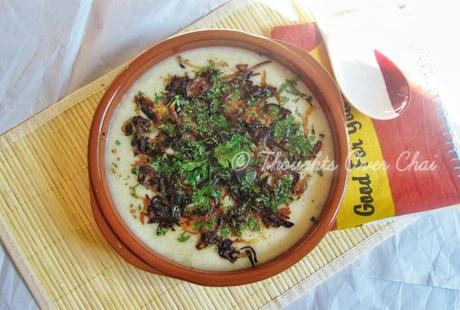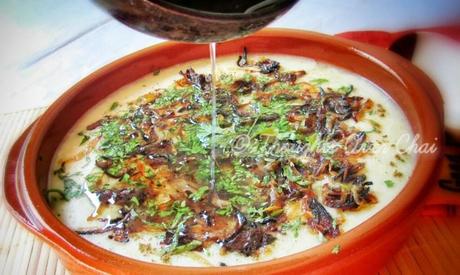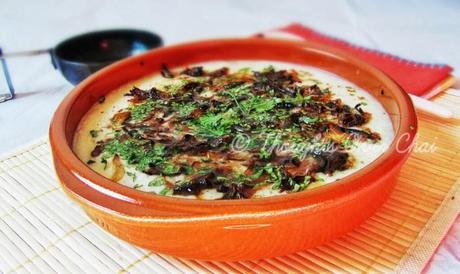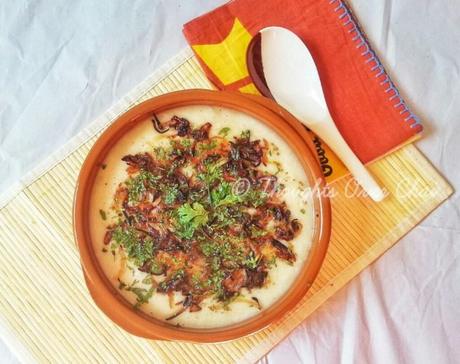Did I ever tell you here that I spent first 5 years of my life in Nagpur (a city in Maharashtra, India) – rich in ethnicity and the hometown of my dad living with his parents, brothers and sisters? As we’d wake up in the morning, all young children of the house stood in queue outside the washroom waiting for their turn to disregard any signs of inertia. Walking past my phuphis (dad’s sisters) who did laundry or any miscellaneous work, we head to the huge kitchen where we’d find women of the family busy cooking a meal for some ten plus members in the house – my chachi (wife of my dad’s brother) and mom sat beside a kerosene stove to make chapatis and my sweet dadijaan (grandmother, my dad’s mom) sat near the main stove-top which ran on gas to cook breakfast for the entire family. Then, again cooked for lunch in the afternoon and dinner in the evening because she didn’t had a refrigerator in her house that time, so she thought food was best served when fresh and is still living with this ideology even after having acquired small luxuries in life. Some things never change. Some things are bound not to change. Only thing is that she now cooks for a couple of people in the house instead of a big house buzzing with dynamic people at all times.
She was the head of her kitchen, politely directing my mom and aunts for work. She wasn’t very rich and led a transparent life . She wore simple clothes, didn’t stock uber fancy kitchen items and washed her own utensils and clothes. Though she kept her two storey house clean, earned her own money by working from home through crocheting bags, laces, pillow covers, napkins etc. and was occupied with the house chores, she did had a social life too. She maintained honest friendship in her circle, met her sisters frequently, went to the mosque regularly, held get-togethers for extended families and made sure festivals wrapped up with grand celebrations only to be welcomed again with wide arms till they come back with great furor next year.

And outside the kitchen door, my dadajaan (grandfather) sat on his favorite cane chair sipping his morning cup of tea while reading through his first newspaper of the day. First because he collected news from almost every publication to read through the entire day. Some fascination. Which my dad inherited from him who sits with piles of newspaper by the day.
…..and holding old Urdu books as evening concludes.
Oh my sweetest grandfather, how much I miss him. He passed away when I was very young, may be 10 years old but I really don’t remember. Yet what my sister and I clearly look back to is a man with strong personality who walked us every evening to his medical shop located two streets away from his house halting for a conversation or two with his friends we met on our way and I’ve lost count at how many times he saved us from parents for any of our mischievousness. Granting he spoiled us silly by offering sweets and peanuts from his store, he also cared about our health by letting us indulge in our favorite fruits from a seller who regularly sat with a make-shift stall outside his shop – mainly oranges and custard apples. He saved kites for us when we came back from a vacation even though the season of flying kites was a month past us considering he knew it brought the broadest joy on our faces and bought us the famed 1 Re. edible chocolate gold coins with unwavering love even though my mom objected. He distracted us with flashy stories from his young days every night as our eyes closed after a tiring day. And then there were moments during the day when I had a privilege to guide him down the several wet steps in his house holding his wooden stick so that he doesn’t slip and pressed his feet and hands with as much force our little hands could accumulate. He was getting old but I fondly remember his love for life and his family. He was a great man and led a simple life just like his wife, my dadijaan. Our neighbors and every shop owner or worker that worked on a 15 minutes pathway from home to his shop sent him greetings when he stepped outside wearing a Jinnah style fur cap because he never liked going out with a naked head, a very well fitting gray coat on his strong body, those white pants which flared at the bottom, gray boots to cover his feet, a stick in his hand for support, always a smile on his face and passion in his heart; with as much charm as any young gentleman. I haven’t seen him riding a car or any two wheeler, although I am not too sure if he ever owned any vehicle in his entire lifetime.
I still have dreams of him sleeping on the bed with black spectacle on an old book beside him in a Living Room because as much as I have seen of him, he just had one wooden bed in the main room of his house where he sat, took afternoon naps and slept as early as 9 pm. And sometimes, I squeezed my tiny body beside him taking up most of his share of blanket. A month back, I woke up in the middle of the night assuming a tall figure standing at the foot of my bed smiling at my new family and me.
And that night was the only time I cried recalling my moments with him since he left us.

On many mornings, dadijaan prepared White Haleem – meatless and a concoction of cooked lentils, a favorite of my grandfather and everyone in the family. As soon as the call for breakfast was announced by those working in the kitchen, my dadajaan, paternal uncles and aunts,cousins, my dad, sister and I gathered in the kitchen. All of us sat on small wooden stools at a height of 2 inches from the ground around the big thaal in a circle and waited for the ladies to serve us hot food. This was the scene every morning in the home of my paternal grandparents. She’d scoop Haleem in a big decorated melamine bowl placed at the center of the thaal, generously sprinkled fried onions on the top, lightly dusted powder of ground spices, poured hot asli ghee (pure clarified butter) over the whole dressing that steeped inside from the corners of the bowl and garnished with fresh mint and coriander. We’d ladle it out in front of us and devoured hot chapatis into the white yet creamy and rich hodgepodge that filled our tummies till it was time to sit for lunch. The best part for me was chewing through the sweetness of fried onions.
And I made sure I added loads on my pile of Haleem.

I am sharing this recipe today because it fills my heart every time I look back on my childhood and knowing as rightfully how blessed I am to have a loving family – the one who makes my life so enriching; only to wish I had spent more time with them. Despite the fact I have not yet mastered the taste that sparkled from the hands of my grandmother, I make White Haleem only in her remembrance and for the time we all sat as a family in her kitchen to eat our meals; the elderly chatted galore while the young springs laughed over some insane odds. Little A doesn’t live in a joint family and miles away from his grandparents whom he get to meet once in a year though I had wished for the opposite. So in whatever way possible, I narrate him stories hoping he’ll get to live the same one day or even better build his own new memories in a surrounding he lives that he’ll always proudly look back to.
Just like I do.
Recipe.
Ingredients -
(Serves 4)
- Rice – 1 cup
- Split Black Gram (Urad Dal) – 1 cup
- Split Yellow Mung (Moong Dal) – 1 cup
- Onions – 4, peeled and thinly sliced
- Pure Ghee – 1/4 cup
- Ground Spices (Garam Masala powder) – 2 tbsp
- Vegetable Oil – 2 tbsp
- Green Chillies – 2-4, de-seeded and chopped
- Salt to taste
- Oil to fry the onions.
- Lemon – 1, cut in wedges.
- Coriander and Mint Leaves – 1 cup, washed and chopped.
Method -
Wash and soak rice and lentils for 3-4 hours covered in clean water. Keeping one onion aside, fry the remaining sliced onions in oil till golden brown and crisp. Remove on a paper towel till it cools down. In a pressure cooker, add the soaked rice and lentils, salt, chopped chillies, a sliced onion, 2 tbsp vegetable oil and around 2 cups water. Close the lid and pressure cook for two – three whistles. Let the pressure drop before opening the lid, check for salt and stir the mixture so it becomes creamy and the lentils are all mashed. Haleem should be little runny. So add water if it dries up and cook with the lid open for a few minutes, stirring continuously. Heat the ghee in a pan till it is sizzling hot, being careful at all times. Pour Haleem in a deep bowl, sprinkle ground spices and fried onions, pour the hot ghee over the top, garnish with leaves and squeeze a lemon. Serve hot with chapatis.

